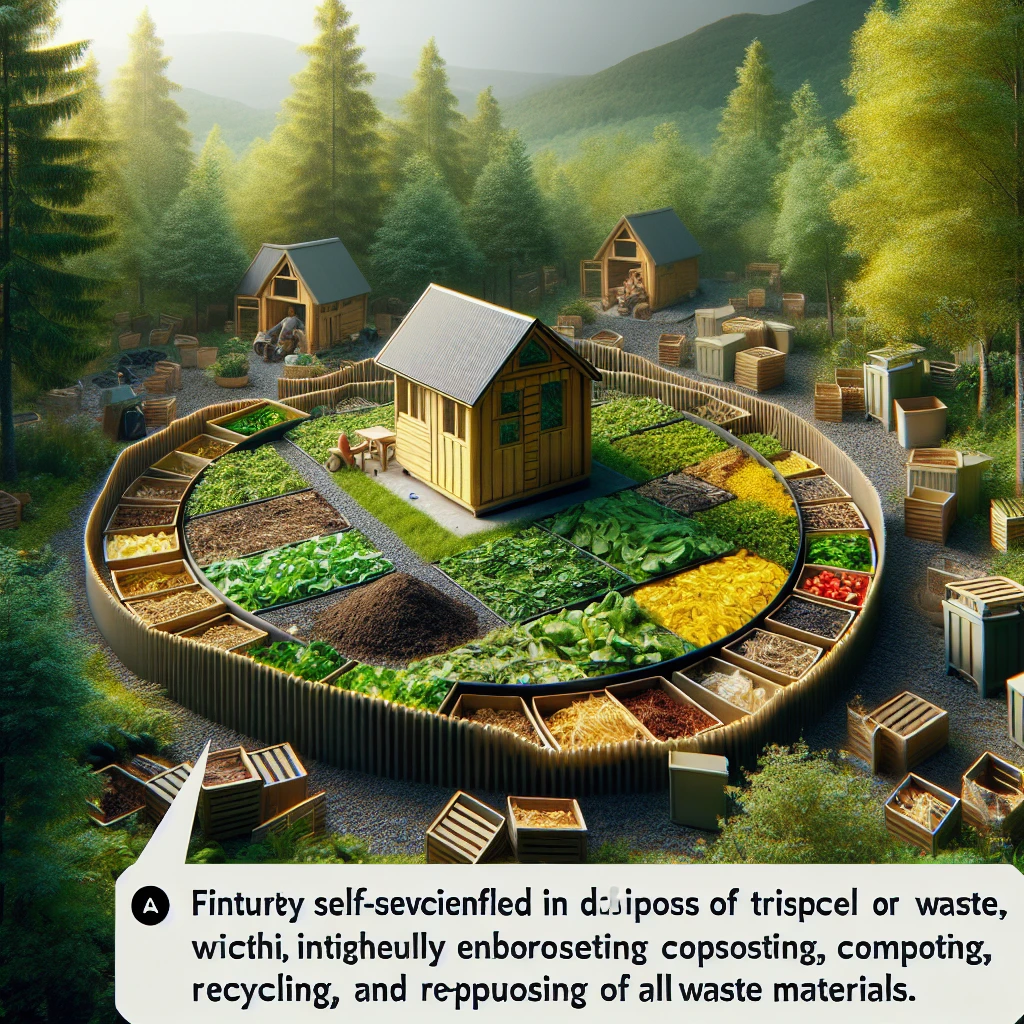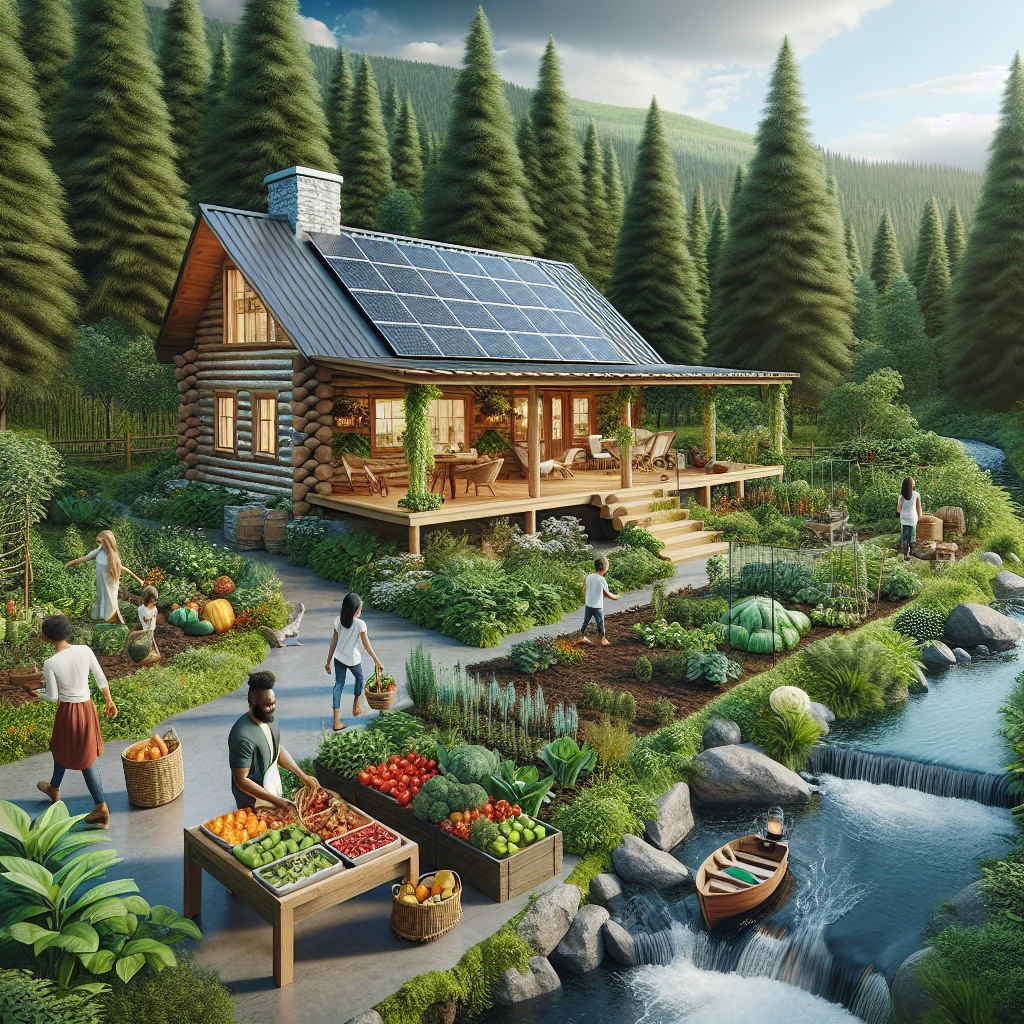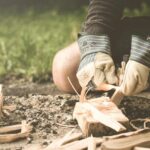

Off-Grid Living Skills are the essential abilities and knowledge needed to live independently without relying on public utilities.
Off-Grid Living Skills are important because they enable individuals to be self-reliant and self-sufficient, reduce environmental impact, and prepare for emergency situations.
These skills include water harvesting and treatment, firewood gathering, hunting, fishing, homebuilding, gardening, and renewable energy generation.
Check out this Youtube video: “How To Prepare To Live Off Grid – These Skills Could Save …”, for valuable insights and practical tips on Off-Grid Living Skills that could be essential for your survival in the wilderness.
Water Management Skills
Finding water sources
To find water sources in the wild, look for areas with dampness on the ground or green vegetation, as these are indicators of potential water. Additionally, digging a large hole a few feet deep in such areas can often yield water.
Filtering and purifying water
When it comes to filtering and purifying water in off-grid living situations, reverse osmosis stands out as an effective method. This process can efficiently remove a wide range of contaminants including bacteria, viruses, and chemicals, ensuring safe and clean drinking water.
Rainwater harvesting techniques
Rainwater harvesting involves the collection and storage of rainwater rather than allowing it to run off. This can be achieved through various methods such as swales, which are trenches used to irrigate farmland and improve soil quality. Another technique is rooftop rainwater harvesting, where rainwater is collected from the roof and redirected to a storage unit for future use.
Food Production Skills
Gardening and farming
Throughout your off-grid living adventure, mastering gardening and farming is essential for sustainable food production. Embracing sustainable agriculture practices such as rotating crops, planting cover crops, and perennials will ensure a diverse and bountiful yield.
By nurturing the soil, practicing crop rotation, and embracing diversity, you can sustainably grow a wide range of fruits, vegetables, and grains, providing a reliable food source for yourself.
Hunting, fishing, and trapping
When it comes to off-grid living, mastering hunting, fishing, and trapping techniques can provide a vital source of protein. Sustainable fishing methods, such as purse seining and longlining, ensure efficient and environmentally friendly fishing practices.
Additionally, understanding different commercial fishing methods, including the use of nets, lines, traps, and divers, can aid in the responsible harvesting of aquatic resources, complementing your food production strategies.
Food preservation methods
Preserving the abundance of food you produce is crucial for long-term sustenance. Exploring various food preservation methods – such as drying, refrigeration, fermentation, canning, pasteurization, and freezing – will ensure that your harvest remains fresh and nutritious for extended periods.
Both freezing and deep-freezing are highly effective preservation techniques, maintaining the organoleptic and nutritional properties of the food, allowing you to enjoy the fruits of your labor for years.
Energy Generation Skills
Solar power systems
Solar power systems have seen remarkable advancements in recent years, with new technological innovations enhancing efficiency and extraction of solar energy. These advancements have led to improved installations that can harness more of the sun’s rays, making solar power a more viable and cost-effective option for off-grid living.
Wind power systems
When considering off-grid living, wind power systems offer a sustainable and cost-effective source of energy. Recent reports indicate that wind energy is becoming increasingly competitive with other forms of electricity generation.
In particular, it has been highlighted as one of the lowest cost electricity generation technologies available, making it an attractive option for off-grid energy solutions.
Off-grid energy storage solutions
Off-grid energy storage plays a critical role in ensuring a continuous and reliable power supply for off-grid living. Major players in the off-grid energy storage systems market include EnerSys, Samsung SDI, LG, Sonnen, and Fronius.
These companies are at the forefront of developing leading products to address the storage needs of off-grid energy systems.
Shelter Building Skills
Constructing a sustainable off-grid home
To construct a sustainable off-grid home, it is essential to focus on environmentally friendly materials and energy-efficient designs. Utilizing recycled and locally sourced materials can reduce the environmental impact while creating a self-sustaining living space.
Incorporating solar panels, wind turbines, and microhydro systems can provide renewable energy sources, ensuring the off-grid home operates efficiently and independently.
Making use of natural building materials
When making use of natural building materials, consider options like adobe, straw bale, or cob, which offer durability, insulation, and low environmental impact. These materials can be sourced locally and often require minimal processing, making them cost-effective and sustainable choices for constructing off-grid homes.
Earthship and cob house construction techniques
Earthship and cob house construction techniques emphasize utilizing natural materials like earth, clay, and salvaged resources to create eco-friendly, resilient structures. These methods focus on passive solar design, thermal mass, and renewable energy integration, promoting sustainable living while minimizing the environmental footprint.
Waste Management Skills
Composting and waste recycling
Recycling food and organic waste into compost offers numerous environmental benefits. It enhances soil health, reduces greenhouse gas emissions, recycles nutrients, and helps mitigate the impact of droughts.
Additionally, composting contributes to waste reduction by diverting food scraps and organic byproducts from landfills, thereby minimizing environmental impact and promoting sustainability.
Eco-friendly waste disposal methods
Eco-friendly waste disposal methods play a crucial role in sustainable living. Some effective approaches include recycling, waste reduction and reuse, garbage disposals, and hazardous waste management.
These methods not only minimize environmental impact but also contribute to the overall health of the ecosystem. By employing eco-friendly waste disposal methods, individuals can actively participate in environmental stewardship and contribute to reducing negative environmental impacts associated with waste disposal.
Essential Survival Skills
First aid and emergency medical skills
Performing first aid in medical emergencies is crucial for survival. In the event of someone being unconscious or unresponsive, remember the ABC of first aid: airway, breathing, and circulation.
It’s essential to be equipped with the knowledge and skills to administer care during crises. Additionally, knowing the right first aid steps, such as wilderness first aid techniques, can be life-saving in remote areas.
Navigation and wilderness survival techniques
Acquiring wilderness navigation skills is paramount for off-grid living. Mastery of techniques like using a compass, reading sun shadows, and locating the North Star for direction finding is indispensable.
These skills, coupled with the ability to navigate using both primitive and modern methods, are crucial for ensuring safety and survival in the wilderness.
Your prompt is really appreciated. Looking forward to guiding you through the unchartered journey of wilderness survival!
Communication Skills
Establishing off-grid communication systems
When it comes to establishing off-grid communication systems, it’s crucial to assess the available options and choose the most suitable method based on individual needs. Factors such as range, reliability, and ease of use should be carefully considered to ensure effective communication in remote areas.
Additionally, creating a communication plan and assigning specific roles within a team can significantly enhance the efficiency of off-grid communication systems.
Using ham radios and satellite phones
Ham radios and satellite phones stand out as reliable communication tools for off-grid living. Ham radios provide an excellent means for preppers to establish communication networks, offering versatility and long-range capabilities.
On the other hand, satellite phones offer global coverage, making them indispensable for individuals residing in extremely remote locations where traditional cellular networks are unavailable. Understanding the technical aspects and best practices for utilizing ham radios and satellite phones is essential for maximizing their effectiveness in off-grid scenarios.
| Off-Grid Communication Options | Description |
|---|---|
| Ham Radios | Versatile and long-range capabilities, ideal for preppers and remote communication networks. |
| Satellite Phones | Global coverage, suitable for individuals living in extremely remote areas without traditional cellular networks. |
Community Building Skills
Creating a self-sustaining off-grid community involves essential skills such as sustainable living practices, renewable energy utilization, and self-sufficient food production. Building structures that harness natural resources like solar or wind power is crucial for an off-grid community’s sustainability.
Additionally, proficiency in water collection, treatment, and recycling is vital for long-term self-sufficiency.
Collaborative farming and resource sharing are fundamental for an off-grid community’s success. Residents need to engage in collective agricultural efforts, sharing knowledge, tools, and labor to ensure food security.
This collaborative approach can also extend to resource sharing, where community members pool resources such as equipment, vehicles, and expertise to enhance overall self-sustainability.
| Skill | Description |
|---|---|
| Sustainable Living | Implementation of environmentally-friendly practices and the utilization of renewable energy sources |
| Self-Sufficient Farming | Proficiency in organic farming, permaculture, and food preservation methods |
| Water Management | Expertise in water collection, treatment, and recycling for sustained off-grid living |
| Community Collaboration | Active participation in communal farming, resource sharing, and cooperative ventures |
Mental and Emotional Resilience Skills
Coping with isolation and self-reliance
Designate tech-free zones in your home and allocate specific times to switch off and focus on yourself. Practice mindfulness: Engage in activities that promote mindfulness, such as meditation, yoga, or spending time in nature.
These practices help bring you into the present moment and cultivate a sense of peace.
Mindfulness and meditation practices for off-grid living
Create a daily meditation practice: Meditation is one of the most well-known mindfulness practices, and for good reason. Practice gratitude: Reflect on the things you are grateful for, even in the midst of adversity, to maintain a positive outlook.
Engage in nature-based activities: Spending time outdoors, whether it’s hiking, gardening, or simply breathing in fresh air, can significantly contribute to mindfulness and emotional well-being.
Legal and Regulatory Compliance Skills
Understanding zoning and land use regulations
Zoning bylaws and land use regulations are crucial aspects for off-grid living. It’s important to understand the zoning regulations specific to the area where you plan to establish your off-grid living setup.
For example, some areas may have restrictions on building structures or specific land use requirements that need to be adhered to for legal compliance.
Off-grid living laws and permits
When delving into off-grid living, it’s essential to research the laws and permit requirements governing this lifestyle. Each region and country may have varying regulations pertaining to living off the grid, such as building codes, waste management, and water usage.
Additionally, obtaining the necessary permits for off-grid living constructions is pivotal to ensure legal compliance and avoid potential issues with local authorities.
Sustainable Financial Management Skills
Off-grid budgeting and financial planning
When it comes to off-grid living, budgeting and financial planning are vital for long-term sustainability. Start by assessing your needs and prioritizing essential expenses such as renewable energy sources, sustainable water solutions, and food production.
Consider alternative income streams through homesteading activities like selling surplus produce, handmade crafts, or offering eco-tourism experiences.
Income generation methods for off-grid living
For generating income off-grid, explore activities that align with your sustainable lifestyle. This could include organic farming, beekeeping, or setting up a home-based online business.
Embrace the concept of circular economy by reusing and upcycling resources, turning them into products for sale or barter. Additionally, consider offering workshops or training sessions in off-grid living techniques to interested individuals or groups.
Recommended Amazon Products for Off-Grid Living Skills
Here’s a curated list of products that can help you advance your off-grid living skills with ease. These recommendations are based on reliability, functionality, and customer reviews.
Portable Water Purifier
This portable water purifier is essential for off-grid living, allowing you to efficiently filter and purify water from various sources. Its compact size and ease of use make it a must-have for off-grid water management. You can find the LifeStraw Personal Water Filter on Amazon by clicking this link.


| Pros | Cons |
|---|---|
| Removes 99.9999% bacteria | Not suitable for large groups |
| Long filter life | Requires suction for drinking |
Solar Power Bank
A solar power bank provides a reliable off-grid energy solution, enabling you to charge essential devices such as phones and flashlights. This particular product offers high efficiency and durability for off-grid energy generation. Find the Solar Charger Power Bank on Amazon by clicking this link.


| Pros | Cons |
|---|---|
| Multiple device charging | Charging speed may vary |
| Built-in LED flashlight | Solar charging time can be long |
Outdoor Survival Kit
An all-in-one outdoor survival kit includes tools and resources for essential survival skills needed in off-grid living scenarios. This kit provides a comprehensive approach to safety and preparedness. You can find the KOSIN Survival Gear and Equipment Kit on Amazon by clicking this link.


| Pros | Cons |
|---|---|
| Compact and portable | Quality of some tools may vary |
| Wide range of tools | Case durability could be better |
Off-Grid Communication Device
For establishing efficient off-grid communication systems, a reliable device such as a two-way radio is crucial. This particular product offers long-range capabilities and sturdy construction for reliable communication. Find the Arcshell Rechargeable Long Range Two-Way Radios on Amazon by clicking this link.


| Pros | Cons |
|---|---|
| Long battery life | Complex interface for beginners |
| Clear sound quality | Limited range in obstructed areas |
Emergency First Aid Kit
A comprehensive first aid kit tailored for off-grid living includes essential supplies for medical skills and emergency situations. This kit offers a wide range of medical items suitable for off-grid environments. Find the Surviveware Large First Aid Kit on Amazon by clicking this link.


| Pros | Cons |
|---|---|
| MOLLE compatible | Slightly bulky for travel |
| Water-resistant | Additional customization needed |
Top Recommended Product for Off-Grid Living Skills
If you’re looking for the best solution for off-grid living, we highly recommend the LifeStraw Personal Water Filter. Here’s why:
This portable water purifier offers exceptional water filtration and portability, making it an indispensable tool for off-grid living. Ready to improve your off-grid water management skills? Check out the LifeStraw Personal Water Filter today for the best results!


Conclusion
Off-grid living skills are essential for self-sufficiency and independence from traditional utilities. These skills include the ability to generate power, collect and store water, and grow food without reliance on public infrastructure.
By mastering these skills, individuals and families can thrive in remote locations or during emergencies.
Additionally, off-grid living skills promote sustainability and environmental stewardship. The ability to harness renewable resources such as solar and wind power, as well as the practice of water conservation and organic gardening, reduces the ecological footprint of off-grid lifestyles.
These skills contribute to a healthier planet and a more harmonious relationship with the natural world.
Moreover, the acquisition of off-grid living skills empowers individuals to live more frugally and resiliently. By learning to live with less waste and consumption, and by developing the ability to adapt to changing circumstances, individuals can experience greater freedom and security in their daily lives.
Off-grid living skills provide a pathway to a simpler, more self-reliant way of life.









